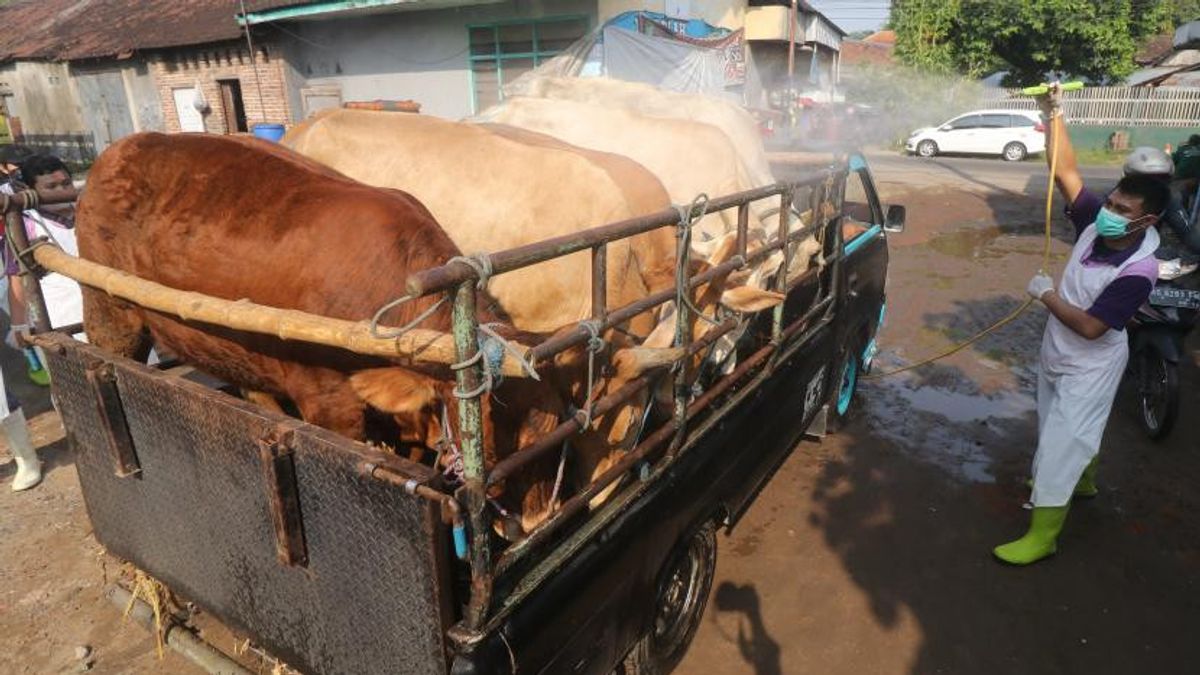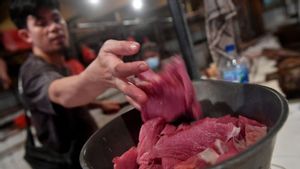JAKARTA - Ahead of Eid al-Adha which falls on July 10, Indonesia is shocked by the emergence of a disease in split-toed cattle which has actually long since disappeared from Earth, namely Mouth and Nail Disease or PMK for short. This disease is a latent danger to livestock, it can even take up to 100 years for a country to completely eradicate it.
PMK in Indonesia this time began to appear in early May 2022. Starting from four districts in East Java, namely Lamongan, Sidoarjo, Gresik, and Mojokerto. The public was shocked by the emergence of a dangerous disease caused by the virus.

"We have prevented the entry of new livestock and the release of sick cattle. I hope the community remains calm and does not panic selling. Insha Allah, everything will be fine," said Yuhronur Efendi, the Regent of Lamongan in his statement in Lamongan, Tuesday 10 May.
PMK spread quickly. After East Java, cases of livestock experiencing FMD symptoms were reported in West Nusa Tenggara, East Nusa Tenggara, Aceh, Central Java, DIY, Bangka Belitung, and many more.
Potential LossesAccording to the Minister of Agriculture, Syahrul Yasin Limpo, in a meeting with Commission IV of the DPR RI on May 23, the transmission of FMD to livestock in Indonesia has covered 15 provinces.
"Reporting data up to May 17 has detected PMK in 15 provinces and 52 regencies and cities. With a total livestock population in the 15 provinces of 13.8 million heads, the number of affected cattle is 3.9 million heads," Syahrul said as quoted by Antara.
The Minister of Agriculture who is also the former Governor of South Sulawesi added that if not handled seriously, PMK would cause huge losses.
"The potential loss could reach Rp 9.9 trillion per year, as a result of decreased production, livestock deaths, as well as the prohibition and restriction of exports of livestock products and their derivatives," said Syahril again.

Syahril also added that PMK only attacks cattle, sheep, goats, buffalo and pigs. This disease is highly contagious with rapid spread because the virus is transmitted through the air. There is no PMK drug yet, it's just that prevention can be done through vaccination.
"However, livestock affected by FMD are not contagious to humans and infected livestock meat can still be consumed by humans by strict slaughter at the slaughterhouse, and infected organs must be destroyed according to the existing animal health protocol," said Syahrul again.
It takes 100 years to be PMK-freeQuoted from the website of the Indonesian Association of Animal Husbandry Engineers and Scholars (ISPI), FMD is the most feared animal disease in the world. Therefore, FMD is classified as Strategic Infectious Animal Diseases (PHMS). Several types of diseases are grouped into PHMS, including: FMD, Anthrax, Rabies, Salmonellosis, Brucellosis, Bird Flu, Swine Flu, and Leptospirosis.
Rochadi Tawaf, Member of the ISPI Expert Council in his writing on May 17, 2022, gave an example of the losses suffered by the livestock world in England, when the FMD epidemic hit the country in 2001. Losses in the livestock sector reached 71 percent, the hotel and restaurant business 52 percent, agriculture 58 percent, trade 47 percent, manufacturing 42 percent, transportation 42 percent, service sector 55 percent, finance 23 percent, construction 49 percent.

It's not just an economic loss. Social losses are also suffered by livestock circles in Indonesia due to this year's PMK. Through the distribution of hoaxes on social media, after the FMD case was discovered in East Java, rumors immediately circulated that the meat and milk of livestock infected with FMD was not fit for consumption. This rumor clearly contradicts what was conveyed by the Minister of Agriculture before the Indonesian House of Representatives.
"Regarding the FMD outbreak that occurred in East Java in early May 2022, Indonesia's hopes of achieving self-sufficiency in beef by 2026 and becoming a granary for Asia 2045 were dashed. The reason is based on the analysis above and what happened, it takes a long time to be free from FMD (100 years)," wrote Rochadi.
Triggered by Rule ChangePMK became known in Indonesia in 1887, with the first case in Malang, East Java. After that, this deadly disease for livestock spread throughout Indonesia. The biggest outbreak of PMK occurred in 1983, also starting from East Java as it is today. It took three years to control the FMD outbreak in 1983, until in 1986 it was declared that Indonesia was free of FMD.
Through the Decree of the Minister of Agriculture No. 260/Kpts/TN.510/5/1986, the declaration that Indonesia was free from PMK was echoed. The world also recognized that Indonesia was free of FMD without the need for vaccination in 1990, through World Animal Health Organization (OIE) Resolution Number XI of 1990.
So far, it is known that there are seven types of PMK, namely: Oise (O), Allemagne (A), German (G), South African territories 1 (SAT 1), SAT 2, SAT 3, and Asia 1. Quoted from the article from the Task Force Team Controlling PMK at Diponegoro University, each of the seven variants of PMK is immunologically different. The 1983 PMK outbreak in Indonesia was only caused by the variant O. The currently developing PMK is not known from what variant.
In general, FMD viruses are about 20 millimicrons in size and do not have a lipid layer. Therefore, the virus that causes FMD is very difficult to eradicate with a disinfectant that works by dissolving fat.
“Indeed, the entire analysis of the prediction of the impact of the losses that will occur, has been reminded long ago by senior livestock leaders and smallholder farmer associations when the PKH Law No.6/1967 was changed to Law No.18/2009. The basic concept of maximum security (country based) is protection against the possible entry of animal diseases into this country, which is converted into a regional zone (zone based)," wrote Rochadi.

Then there was a clash of opinions until it was brought to the Constitutional Court (MK). The Constitutional Court through its decision letter Number 137/PUU-VII/2009 finally determined that protection against animal disease transmission to Indonesia remains country based or country based, not zone based.
However, changes occurred again in 2014 when the Indonesian government and the DPR enacted Law No. 18/2009 which used a zoning basis for the protection of livestock diseases, not a state policy. This rule change was supported by the Constitutional Court with a decree No. 129/PUU-XIII/2015, which legalized the import of livestock and their derivative products from other countries that adhered to a zoning basis.
This rule change, according to Rochadi, allowed Indonesia to import livestock and their derivative products from India in 2016. Even though India is a country that has not been declared free from FMD by the OIE. From this policy of easing imports of livestock and their derivative products, PMK has re-emerged in Indonesia after being declared free since 1986.
Now the status of Indonesia by the OIE is no longer categorized as a country that is free of Mouth and Nail Diseases (FMD) without vaccination. The consequences that must be borne are of course complicated if Indonesia has to trade livestock and their derivative products with other countries.
However, the opinion that imports of meat from India is the trigger for the reappearance of Mouth and Nail Diseases (FMD) in Indonesia is denied by the Director of Bulog, Budi Waseso.
"PMK has nothing to do with imported buffalo meat. Because when the meat arrives in Indonesia, it cannot be sold immediately because there is a laboratory examination, so it is suitable for consumption and then circulated," said Budi Waseso at a press conference attended by VOI, at the Bulog Headquarters, Tuesday. , May 10.
Of course, when disagreements continue to occur, Foot and Mouth Disease or PMK is again endemic in Indonesia. Society has already lost.
The English, Chinese, Japanese, Arabic, and French versions are automatically generated by the AI. So there may still be inaccuracies in translating, please always see Indonesian as our main language. (system supported by DigitalSiber.id)












